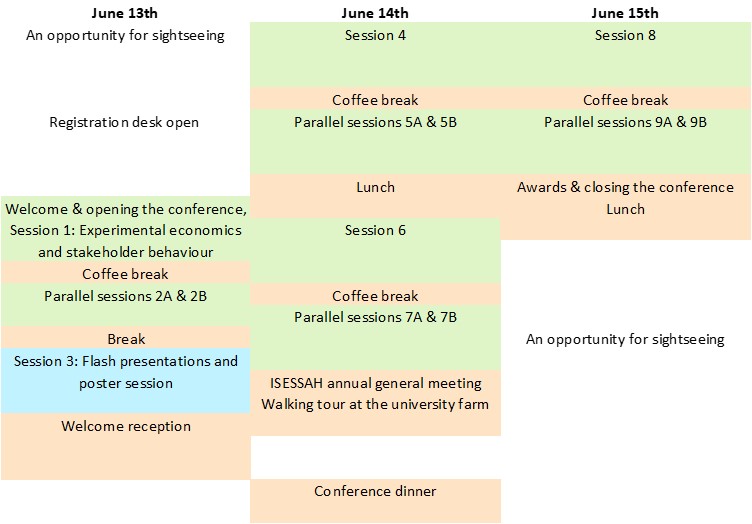ISESSAH conference 2023 programme
Helsinki, Finland, 13th – 15th of June 2023
Call for abstracts — Programme — Registration, accommodation & getting there

Background
Social, economic and environmental sustainability of animal production is becoming an increasingly important issue for farmers and other supply chain actors. Outbreaks of exotic animal diseases and presence of production diseases and endemic diseases can severely reduce economic profitability and productivity of farming and cause disruptions in the market. Hence, disease prevention, risk management and control measures such as biosecurity and good farming practices, disease control programs, containment and eradication of disease outbreaks must be selected to control and/or mitigate animal disease and their negative consequences Various economic and other societal and social-psychological circumstances influence decisions that farmers, veterinarians, government authorities and other stakeholders make regarding animal health.
Therefore, when suggesting animal disease control programs or animal health promoting programs, economics and other social sciences should be taken into account. These can contribute to our understanding of what are the most preferred ways to control animal health. New insights and theoretical and methodological advances are needed to better understand the behaviour and choices made by farmers, veterinarians, policymakers, food operators, consumers and other relevant actors. The International Society for Economics and Social Sciences of Animal Health (ISESSAH) aims to improve animal health and welfare policies, programme and projects through more nuanced use of concepts and tools available in economics and social science disciplines. The annual conference is a key tool to promote this objective.
Conference theme and programme
The 2023 ISESSAH conference will be held 13th – 15th of June 2023 Viikki campus in Helsinki, Finland (address: Latokartanonkaari 9, 00790 Helsinki, Finland).
The 2023 ISESSAH conference will be held 13th – 15th of June 2023 Viikki campus in Helsinki, Finland (address: Latokartanonkaari 9, 00790 Helsinki, Finland). The main theme of the conference is “Understanding stakeholder behaviour and socio-economic implications of practices and policies of animal health”.
The target group of the conference includes researchers, graduate students, other academics, government officials, advisors, veterinarians, industry representatives and all others interested in economics and social sciences applied to animal health.
Conference programme will include keynote presentation from the leading scientists in economics and social sciences, invited talks of key stakeholder representatives in the livestock sector, and oral and poster presentations given by conference participants. The keynote speakers will be announced in January 2023. Social programme, including a welcome reception and a conference dinner, will also be organised. The conference will be organised by ISESSAH in collaboration with the Nordic Association of Agricultural Science (NJF), Natural Resources Institute Finland (Luke) and University of Helsinki.
Invited Speakers
Invited speakers of ISESSAH 2023 include
- Jens Rommel, Associate Professor at Decision-making and Managerial Behavior research group, Department of Economics, Swedish University of Agricultural Sciences, Sweden
- Beth Clark, Lecturer in Food Marketing at School of Natural and Environmental Sciences, Newcastle University, United Kingdom
- Arnaud Rault, Researcher focussing on animal health economics at Oniris, BIOEPAR (Biology, Epidemiology and Risk Analysis of Animal Health unit), National Research Institute for Agriculture, Food and Environment (INRAE), France
- Taina Aaltonen, Deputy Director General at Ministry of Agriculture and Forestry, Finland, Chief Veterinary officer of Finland and delegate of Finland to the World Organisation for Animal Health
- Ina Toppari, Executive manager at Animal Health ETT r.a., Finland.
The schedule of the conference is presented below. The registration desk opens at 11:00 on June 13th. The conference will be finished by 14 o’clock on June 15th.

Guidelines for preparing presentations and posters
Each oral presentation is allocated 15 minutes timeslot, which includes maximum 12 minutes for the presentation and at least 3 minutes for questions. Please plan your presentation according to this schedule. To help to set up the presentations on computers, please send your presentation by email to njf.nordicagriculture(at)gmail.com in the day before your session.
Posters should be set up by before the start of the poster session and displayed until the end of the conference. Preferred poster size is A0 (width 841 mm × height 1 189). Pushpins will be provided on poster stands. During the poster session, please stay close to your poster and be prepared to answer questions concerning your study.
Flash presentations are short presentations given on selected posters. A flash presentation includes a short introduction (three minutes) of the main points of your poster in the dedicated session in the lecture room B1. Maximum two slides or an electronic copy of your poster will be displayed on the screen during the flash presentation. To help to set up the flash presentations on computers, please send your flash presentation by email to njf.nordicagriculture(at)gmail.com in the day before your session.
The 2023 ISESSAH conference will be held 13th – 15th of June 2023 Viikki campus in Helsinki, Finland (address: Latokartanonkaari 9, 00790 Helsinki, Finland). Sessions will take place in lecture rooms B1 and B2. Welcome reception will be organised in lobby area 173A (meeting centre) and conference dinner at Restaurant Kappeli (Eteläesplanadi 1, Helsinki). Participants may use meeting room A169 in the meeting centre for finalizing their presentations (computers are not provided). For additional queries, please consult the registration desk.
Detailed conference programme:
Contact
For questions, please contact: jarkko.niemi@luke.fi.
The conference is organised in collaboration between:


